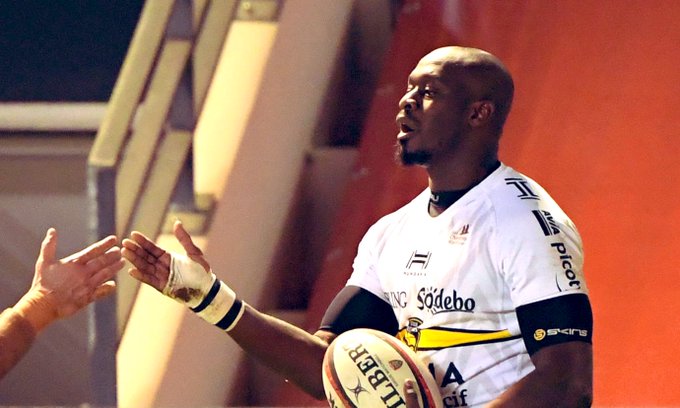Raymond Rhule was dropped by the Springboks for his defensive frailties and now he plays in the most defensively demanding position on the pitch. ANDRE-PIERRE CRONJE chronicles Rhule’s resurgence in France.
READ: Boks set for alignment camps
Rhule has always been a silky operator. He first burst on to the scene as part of the same Springbok U20 side as Jan Serfontein, Handre Pollard and Pieter-Steph du Toit that claimed victory in the 2012 Junior World Cup.
Rhule scored three times in that tournament, but it was his two tries in the semi-final against Argentina which accentuated him as something special. On two occasions, he picked the perfect line to slice open the defence, and on two occasions beat the covering fullback with slick footwork.
Rhule’s efforts in the tournament clearly did not go unnoticed. He accompanied the senior Springbok side on their end-of-year tour later that year. Heyneke Meyer, the recently appointed Bok coach, had clearly earmarked the wing as a future Springbok. There was every reason to believe he would be.
Sport, however, is unforgiving. Though Rhule continued to excel on the wing for the Cheetahs, scoring plenty of tries in Super Rugby, there remained a critical deficiency in his game which denied him higher honours.
Much has been made of Rhule’s defensive frailties. Some of the criticism was deserved, some grossly exaggerated. Nevertheless, the unfortunate reality of South African rugby is that once a player develops a reputation for being defensively weak (whether it is justified or not) they have little chance of reaching the highest echelons.
In spite of the ongoing criticism and speculation, Rhule did manage to break into the Springbok team. He made his debut against France in June 2017, nearly five years after he first accompanied the squad to Europe.
His subsequent performances in the green and gold were erratic, punctuated by moments of dazzling brilliance and despairing error. The talent was there, but Rhule never quite looked comfortable at international level.
Many felt that the Cheetahs – unrenowned for their defensive prowess – was not the best environment for Rhule to improve on his technical shortcomings. A move to the Stormers in 2018 was touted as a panacea for his defensive woes and an opportunity to propel/rescue his fledgling Springbok career.
It was not to be for the wing. Rhule’s move to the Cape proved somewhat disastrous. He turned out only 15 times for the Stormers and was released from his contract before even a year had passed. Like so many talented South African players who had not reached their potential, he chose to make the move to France.
Rhule joined FC Grenoble in late 2018. The following season the side recorded only three wins from 16 games, and were promptly relegated to France’s second division. You’d be forgiven for expecting that this is where the story would end. There would prove to be one more twist in the tale, though.
At the same time that Rhule was plumbing the depths of France’s second division with Grenoble, 700km away on the other side of the country, former Ireland great Ronan O’Gara took over as head coach at La Rochelle.
O’Gara, who had just finished a coaching stint with the Crusaders, was a man with a bold vision. He was determined to transplant a Kiwi style of play into his new side. His ‘KBA’ (keep ball alive) philosophy – which prioritises an offloading and passing game above rucks and set pieces – would transform La Rochelle.
Of course, O’Gara needed to find the right playing personnel to implement his vision; and that is where Raymond Rhule re-enters our story.
O’Gara and his coaching staff saw in Rhule something that many other coaches had not. His elusive running and deft handling was exactly what was needed to fit La Rochelle’s new ‘KBA’ style. Any defensive shortcomings could be easily remedied.
Despite playing in the second division, Rhule was contracted to join La Rochelle for the following season (2020-21). O’Gara had big plans for the former Springbok.
The move has proven to be a revelation. La Rochelle currently sit second on the Top14 log and Rhule has started in all but one of their fixtures. More surprisingly, O’Gara has made the decision to move Rhule from wing into the outside centre position.
For the naysayers this would have been unthinkable. How could a man as defensively porous as Raymond Rhule be trusted in the most difficult defensive position on the pitch?
O’Gara, however, has backed his man. It is paying dividends. This weekend Raymond Rhule will line up in the outside-centre position to face Sale in the semi-finals of Europe’s top rugby competition. That he would ever find himself in this position (literally and metaphorically) was unthinkable a few years ago.
Rhule’s resurgence holds many lessons. It proves that no player should ever be written off. With hard work, the right environment and, most importantly, a coach that believes in you, you can go far. Whatever the future holds for Raymond Rhule, his is a story that should never be forgotten.




